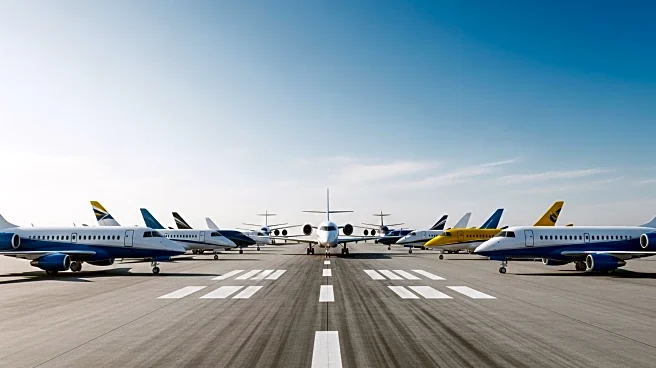What's Happening?
Saudi Arabia has significantly expanded its international aviation network by signing 17 new bilateral agreements and memoranda of understanding (MOUs) with various countries. These agreements were finalized during the 42nd General Assembly of the International Civil Aviation Organization (ICAO) held in Montreal from September 23 to October 3. The deals are designed to enhance bilateral cooperation in air transport, develop regulatory and legislative frameworks for civil aviation, and increase international air connectivity. They also aim to reinforce aviation safety and security. Key signatories include Saleh bin Nasser Al-Jasser, the Minister of Transport and Logistic Services, and Abdulaziz bin Abdullah Al-Duailej, President of the General Authority of Civil Aviation (GACA). The agreements involve countries such as Antigua and Barbuda, South Africa, Brazil, and China, among others.
Why It's Important?
These agreements are crucial for Saudi Arabia's Vision 2030 plan, which aims to transform the country into a global logistics hub. By enhancing international air connectivity and cooperation, Saudi Arabia seeks to support economic growth and boost tourism. The agreements are expected to increase the number of international travel destinations to over 250 and raise air cargo capacity to 4.5 million tons annually by 2030. This expansion could lead to increased passenger traffic, with a target of reaching 330 million passengers annually. The move is likely to benefit the global aviation industry by opening new routes and enhancing safety and regulatory standards.
What's Next?
Saudi Arabia's ambitious plans under Vision 2030 will likely lead to further developments in its aviation sector. The country aims to continue expanding its international partnerships and improving its aviation infrastructure. Stakeholders in the global aviation industry, including airlines and regulatory bodies, may respond by seeking new opportunities for collaboration and investment in Saudi Arabia. The success of these agreements could set a precedent for other nations looking to enhance their aviation networks.
Beyond the Headlines
The expansion of Saudi Arabia's aviation network could have broader implications for global trade and tourism. By increasing connectivity, the country may become a more attractive destination for international businesses and tourists. Additionally, the focus on safety and regulatory improvements could influence global aviation standards, encouraging other countries to adopt similar measures. This development also highlights the growing importance of international cooperation in addressing challenges in the aviation sector.









